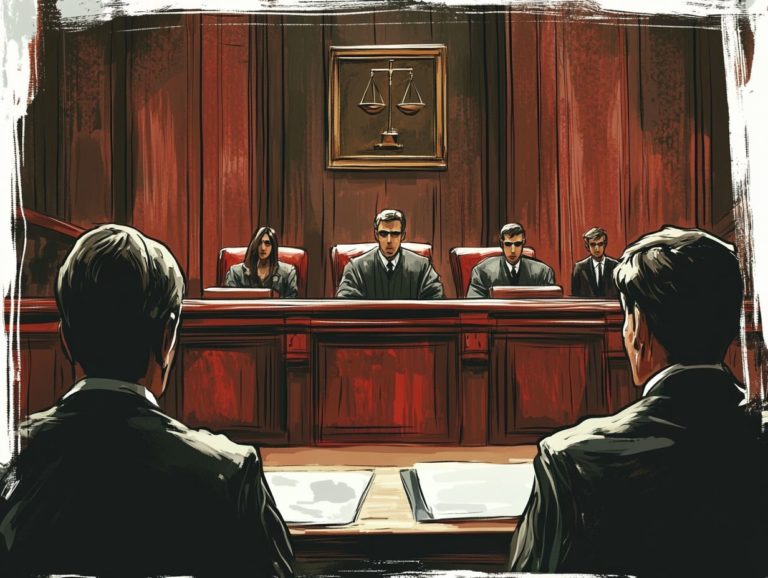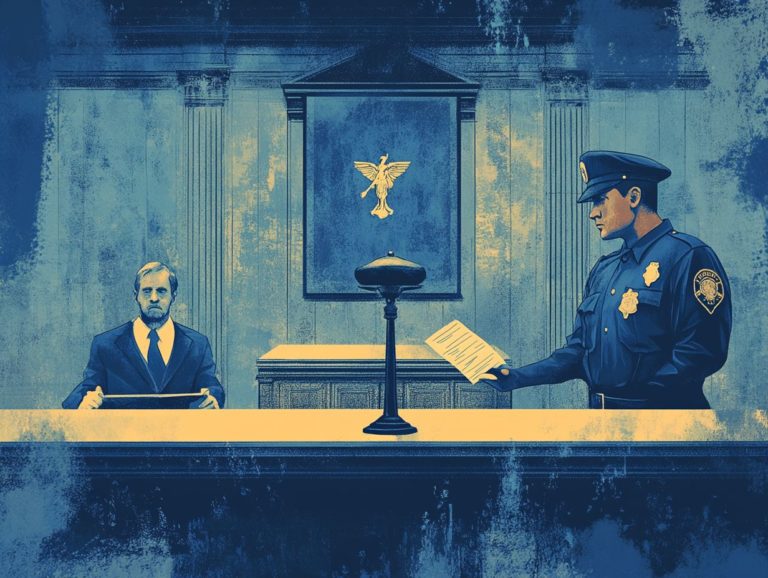What Are the Common Defense Strategies?
In a world brimming with challenges and uncertainties, grasping defense strategies becomes essential for navigating various situations be it in business, personal safety, or competitive environments.
This article delves into the definition and significance of defense strategies. You ll explore common defensive techniques, consider the factors that influence your strategy selection, and discover real-life success stories that illuminate their effectiveness.
By the end of this article, you’ll learn how to use these strategies to protect yourself effectively!
Contents
- Key Takeaways:
- Understanding Defense Strategies
- Types of Defense Strategies
- Common Defensive Techniques
- Factors to Consider When Choosing a Defense Strategy
- Effectiveness of Defense Strategies
- Frequently Asked Questions
- Curious about the most effective defense strategies?
- What is the difference between proactive and reactive defense strategies?
- What is a physical defense strategy?
- What is a psychological defense strategy?
- How can communication be used as a defense strategy?
- What other examples of common defense strategies are there?
Key Takeaways:

Defense strategies are essential for protecting oneself from threats and attacks. Passive and active defense strategies differ in their approach, with passive strategies being more reactive and active strategies being more proactive. When choosing a defense strategy, it is important to assess the situation and goals to determine the most effective approach.
Understanding Defense Strategies
Understanding defense strategies is crucial for navigating criminal law.
The stakes are high, and the consequences of charges can be severe.
Effective defense strategies encompass a range of legal tactics, including self-defense, entrapment, and affirmative defenses. Understanding the importance of a defense strategy is crucial, as these tactics are crafted to instill reasonable doubt in jurors and scrutinize the prosecution’s evidence.
In this section, you will delve into the significance of these strategies, the burden of proof that the prosecution must carry, and the important role that skilled legal counsel plays in securing fair representation throughout the trial process.
Types of Defense Strategies
Defense strategies in criminal cases can be broadly classified into passive and active approaches, each designed to address specific circumstances and cater to your unique needs.
Passive strategies might involve tactics like evidence suppression or emphasizing the reasonable doubt standard.
In contrast, active strategies embrace more vigorous legal maneuvers, such as presenting an alibi defense or challenging police misconduct.
Selecting the most suitable strategy hinges on the nature of the criminal charges, the evidence at hand, and the distinctive situation you find yourself in.
Passive vs. Active Strategies
Passive and active strategies in criminal defense represent two distinct methodologies that can be employed to secure the best outcomes for clients accused of criminal activity. Understanding the nuances between these approaches is essential.
For example, while passive strategies often focus on carefully reviewing the prosecution’s evidence and leveraging legal expertise to navigate procedural pitfalls, active strategies necessitate a more hands-on approach.
In a theft case, you might deploy a passive strategy to challenge the validity of surveillance footage. An active strategy could involve crafting a robust alibi defense by presenting witnesses who can attest that the accused was miles away at the time of the incident.
Each method is designed to protect clients rights effectively, ensuring they have strong legal representation, no matter which tactics are deployed.
Common Defensive Techniques

Common defensive techniques in criminal cases can profoundly influence the outcome. These techniques employ a range of legal arguments and strategies tailored to the unique circumstances of each situation.
For instance, self-defense justifies actions taken to protect oneself, while the alibi defense firmly establishes that the defendant was elsewhere during the alleged crime.
Defenses based on consent, entrapment, and other affirmative arguments can effectively dismantle the prosecution’s case and create reasonable doubt.
Examples and Applications
Examples and applications of various defense strategies vividly illustrate their real-world functionality and potential to determine the outcome of a criminal case.
A defense attorney might invoke an insanity plea. This involves presenting thorough psychological evaluations that spotlight the defendant’s mental state at the time of the offense. Such strategic maneuvers can shift the jury’s perception, framing the individual as a victim of circumstances rather than just a perpetrator.
An entrapment defense can show how law enforcement s actions led the defendant to commit an illegal act they wouldn t have otherwise considered. By emphasizing these nuanced elements, defense strategies can significantly impact the jury’s understanding and, ultimately, the verdict. This underscores the crucial role of context within the justice system.
Factors to Consider When Choosing a Defense Strategy
Choosing the right defense strategy is crucial. It depends on the details of the charges and the strengths and weaknesses of the prosecution’s evidence.
It’s essential to understand your situation and the potential defenses available to you. The competence of your counsel is also vital for presenting your case persuasively in court.
Your chosen strategy should align with your objectives, whether that means pursuing a plea bargain, establishing your innocence, or minimizing criminal liability.
Assessing the Situation and Goals
Assessing your situation and establishing clear goals are vital steps in crafting the most effective defense strategy for your criminal case. This requires open communication with your defense lawyer.
Your goals might range from proving your innocence to negotiating a plea bargain. This process should be grounded in a realistic evaluation of the evidence, potential defenses, and associated risks.
Having legal representation is essential. A skilled defense lawyer prioritizes your interests and guides this assessment.
Choosing a defense strategy without a thorough analysis can lead to unexpected complications that may worsen your criminal liability. A competent defense lawyer will provide invaluable insights, helping you navigate the intricacies of your case.
They will conduct a detailed review of the strengths and weaknesses of the evidence. Together, you’ll set achievable objectives that align with legal standards and your personal circumstances.
This proactive approach enables you to face the charges while safeguarding your rights in the pursuit of justice.
Effectiveness of Defense Strategies

The effectiveness of defense strategies in criminal cases can fluctuate dramatically. This variability is influenced by the unique circumstances surrounding each case, the caliber of legal representation, and the specific nature of the charges.
Strategies that skillfully cultivate reasonable doubt in jurors can lead to favorable outcomes, such as acquittals or reduced charges. Conversely, ineffective strategies may result in jury convictions, which can impose serious repercussions for the accused.
Assessing the impact of these strategies on case outcomes is crucial for grasping their significance within the criminal justice system.
Real-Life Success Stories
Real-life success stories demonstrate the transformative power of effective defense strategies. These narratives highlight the crucial role of skilled legal counsel, who are adept at understanding the law and employing techniques like the insanity defense, self-defense, or alibi defense to craft a compelling case on your behalf.
With meticulous preparation and a profound grasp of criminal law, defense attorneys achieve remarkable outcomes. These cases highlight the necessity of effective advocacy in the quest for justice!
Consider a striking case involving a young man wrongfully accused of a violent crime. His legal team conducted a thorough examination of the evidence, uncovering video footage that directly contradicted the prosecution s narrative.
Through strategic cross-examination of witnesses and the presentation of expert testimonies regarding the fallibility of eyewitness accounts, they systematically dismantled the prosecution’s case. This case is a powerful reminder of how diligent investigations and innovative legal techniques can illuminate the truth, ultimately protecting an innocent individual’s future and restoring confidence in the legal system.
Potential Limitations
While defense strategies can serve as powerful tools in challenging prosecution evidence, they have their limitations. These limitations can ultimately affect the outcome of a criminal case.
Employing certain defensive tactics can backfire, leading to unintended consequences that may worsen your situation. For example, presenting an alibi may depend on the reliability of additional witnesses, which could undermine your defense s credibility.
Some strategies might expose weaknesses in your character or background, raising unsettling concerns about moral culpability. The dynamics of courtroom proceedings, including the judge’s interpretation of admissibility and evidentiary standards, can further impose constraints on how effectively these strategies are executed.
Thus, a thorough understanding of these factors enables your legal representatives to prepare your case more adeptly.
Frequently Asked Questions
Curious about the most effective defense strategies?

Common defense strategies refer to techniques and tactics used to protect oneself from potential threats or attacks. To understand what makes an effective defense strategy, it’s important to recognize that these strategies can vary depending on the situation and the specific threat, but some of the most common include:
What is the difference between proactive and reactive defense strategies?
Proactive defense strategies involve taking preemptive measures to prevent a threat, while reactive defense strategies involve responding to a threat after it occurs. Proactive strategies are often more effective, as they help prevent the threat from manifesting in the first place.
What is a physical defense strategy?
A physical defense strategy involves using physical barriers or tools to protect oneself or one’s property. Examples include installing locks, security cameras, or fences to prevent unauthorized access or break-ins.
What is a psychological defense strategy?
Psychological defense strategies use mental or emotional tactics to protect oneself. This can include techniques such as avoidance, denial, rationalization, or even humor to cope with potential threats.
How can communication be used as a defense strategy?
Communication can be a powerful defense strategy in diffusing potential conflicts. This involves open and honest communication to address misunderstandings or grievances, or strategic communication to de-escalate a volatile situation.
What other examples of common defense strategies are there?
Other common defense strategies include legal defense, such as hiring a lawyer against a lawsuit, or financial defense, such as diversifying investments to protect against market volatility. Additionally, some may employ spiritual or religious defense strategies, such as prayer or meditation, to cope with challenges. For a deeper understanding, you can explore the different types of defenses.






